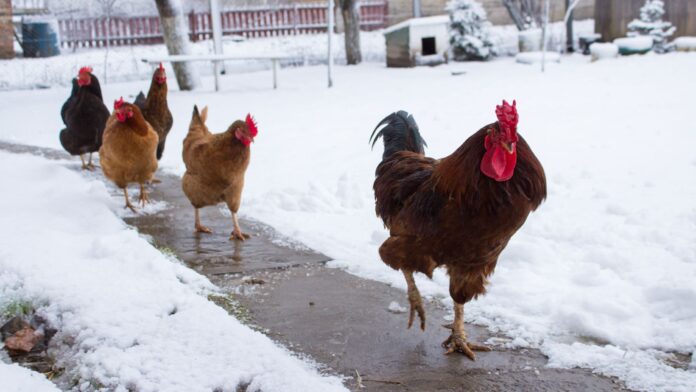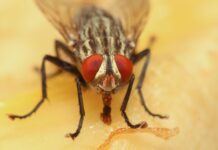Winter can be a stressful time for chickens and ducks due to the cold, limited daylight, and changes in their environment. To keep your birds happy and stress-free, ensure they have proper shelter, clean water, nutritious food, and enough space to move around. Creating a routine and offering extra enrichment will help your birds feel more secure and healthy during winter.
1. Provide Adequate Shelter
Cold temperatures are a major stressor for chickens and ducks. They need a well-insulated coop or shelter to protect them from freezing winds and snow. For chickens, ensure their coop is draft-free but still ventilated to prevent moisture buildup, which can cause frostbite. Ducks are hardier but still benefit from a dry, wind-protected area where they can take shelter.
A few key tips for shelter:
- Insulation: Add straw, wood shavings, or hay on the floor to insulate and provide warmth.
- Roosts and Platforms: Chickens prefer roosting on raised perches, which keep their feet off the cold ground. Ducks appreciate raised platforms but also need dry ground space for resting.
- Windbreaks: Consider adding a windbreak, like tarps or wooden panels, outside their enclosure to shield them from winter winds.
2. Keep Water Accessible and Unfrozen
Fresh water is essential, and frozen water can be a major source of stress in winter. Chickens and ducks need constant access to unfrozen water, which can be challenging when temperatures drop below freezing.
Ways to keep water unfrozen:
- Heated Waterers: Invest in heated water bowls or water heaters specifically designed for poultry.
- Daily Water Changes: If a heated waterer isn’t possible, regularly replace frozen water with fresh, lukewarm water multiple times a day.
- Prevent Dampness: Ducks splash in water, so avoid placing their water bowls inside the shelter to keep bedding dry.
3. Offer Nutritious, High-Energy Food
Winter can make it harder for chickens and ducks to find extra food, so they’ll rely more on what you provide. A nutritious diet is crucial to help them maintain body heat and reduce stress. Protein-rich and calorie-dense foods can give your birds the energy they need to stay warm.
Feeding strategies for winter:
- Supplement Protein: Include high-protein treats like mealworms, black soldier fly larvae, or scrambled eggs to boost their diet.
- Scratch Grains: Offering scratch grains in the evening helps chickens and ducks generate heat overnight as they digest.
- Greens and Vegetables: Ducks in particular enjoy leafy greens, so provide them with chopped vegetables and greens to keep them satisfied.
4. Extend Daylight Hours
Winter’s short days can impact your birds’ mood, especially for chickens, which rely on daylight to lay eggs. Ducks are less affected, but both animals benefit from extra light during the darkest months.
Lighting tips:
- Supplement Light: Install a timer-operated light in the coop to extend “daylight” hours. Aim for around 14-16 hours of light daily.
- Soft Lighting: Use soft, warm lighting to mimic natural daylight and avoid overly bright lights, which can stress the birds.
5. Maintain Clean Living Conditions
Dirty bedding or damp coops can cause stress and health problems in both chickens and ducks. Ammonia buildup from droppings can harm their respiratory systems, and damp conditions increase the risk of frostbite.
Cleaning tips:
- Deep Litter Method: This involves adding fresh bedding on top of old bedding to create a composting effect, which generates warmth and reduces the frequency of full cleanouts.
- Regular Spot Cleaning: Even with the deep litter method, spot-clean daily to remove wet spots and droppings, especially in duck areas where water spills are frequent.
- Dry Nesting Areas: Keep nesting boxes dry and lined with straw to give chickens a cozy, warm place to lay their eggs.
6. Provide Enrichment and Space to Roam
Being cooped up all winter can make birds irritable and stressed. Chickens and ducks both need enrichment and enough space to move around to stay healthy and happy.
Ways to keep birds active:
- Outdoor Time: Let them outside on sunny, calm days, even if it’s cold. Chickens and ducks can tolerate low temperatures if protected from wind and moisture.
- Toys and Foraging: Scatter food or use hanging treat holders to encourage natural foraging behaviors. Chickens enjoy pecking at hanging vegetables like cabbage, while ducks love splashing in shallow pans of water.
- Dust Baths: Provide a dry area for dust bathing to help chickens clean their feathers and relieve stress.
7. Minimize Sudden Changes and Create a Routine
Chickens and ducks thrive on routine. Sudden changes in their environment, feeding schedule, or daily activities can cause unnecessary stress, especially during winter when they’re already adjusting to colder conditions.
How to create a routine:
- Consistent Feeding Times: Stick to a regular feeding schedule so they know when to expect food and water.
- Nighttime Routine: Establish a predictable routine for closing up the coop or shelter at night, ensuring all birds are secure and settled before dark.
- Slow Introductions to New Birds or Changes: If you need to introduce new birds, do so slowly and carefully to avoid disrupting the pecking order during an already stressful season.
By following these tips, you can help your chickens and ducks thrive during winter. Providing warmth, clean water, nutritious food, and enrichment can significantly reduce stress, leading to healthier and happier birds throughout the colder months.











